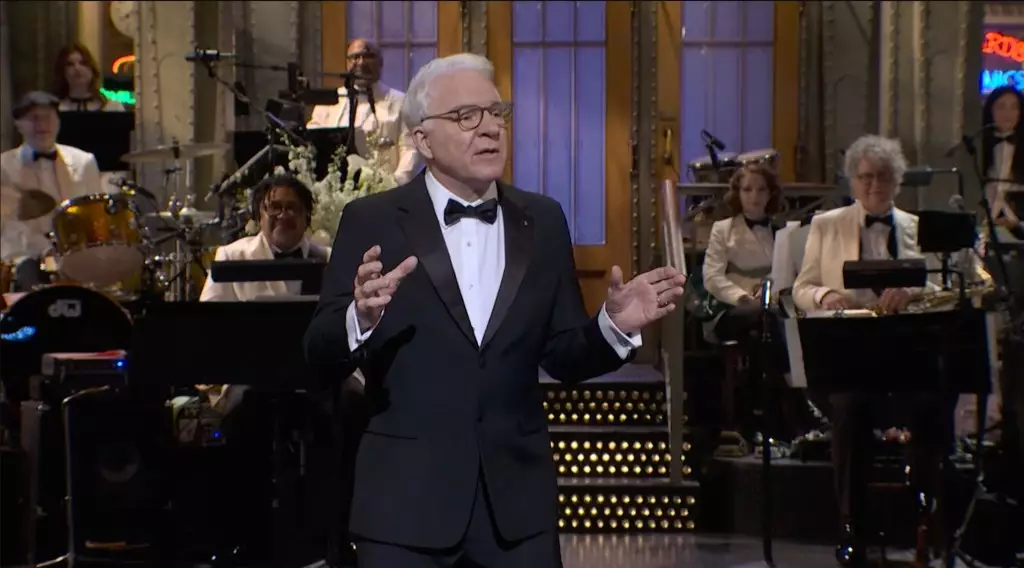In a remarkable display of humor and nostalgia, Steve Martin seized the opportunity to reclaim his title as a long-time host of *Saturday Night Live* (SNL) during the highly anticipated SNL50: The Anniversary Special. With both Martin and Alec Baldwin having hosted the iconic program 17 times each, Martin’s inclusion in the anniversary event provided him with a platform to blend pride, satire, and poignant commentary on the state of television and politics. Martin, alongside his longtime friend and comedic partner, Martin Short, along with former SNL writer John Mulaney, delivered a monologue that encapsulated the spirit of the show while addressing contemporary issues.
From the onset of his monologue, Martin brought a refreshing blend of wit and insight, exploring the theme of diversity. Positioned as SNL’s “newest diversity hire,” he cleverly tied his introduction to the ongoing national conversations surrounding Diversity, Equity, and Inclusion (DEI). This comment resonated with viewers amid the backdrop of significant policy changes resulting from the newly instated Trump administration, thus managing to be both humorous and relevant. His quip about vacationing on the “Gulf of Steve Martin” humorously reflected the absurdity often found in political maneuvering, while simultaneously poking fun at the administration’s attempts to rebrand cherished geographical locales.
Martin’s comedic prowess shone brightly as he delved into the subject of SNL’s longevity. Highlighting that someone born during the show’s inaugural season could now, ironically, be deceased from natural causes, he adeptly wove nostalgia with frankness. This commentary not only served as a humorous nod to the show’s history but also as a reminder of its enduring cultural significance. By calling the monologue the “traditionally the weakest part of the show,” he managed to humble the moment while simultaneously diverting the audience’s attention back to the comedic aspects of the legacy.
Amidst his monologue, Martin spared no one in his light-hearted jabs, especially targeting comedy titan Bill Murray, who was absent from the audience. In a brilliantly crafted joke, he welcomed Murray by stating, “We wanted to make sure that Bill would be here tonight so we didn’t invite him.” This cleverness serves as a testament to Martin’s unique ability to poke fun at his peers while maintaining respect for their contributions. Furthermore, his shout-out to David Letterman took on an additional layer of humor as he thanked him for “leaving the sheep at home.” These moments not only enriched the comedic tapestry of the night but also built a communal atmosphere among the audience and fans watching at home.
A noteworthy segment in Martin’s monologue was his commendation for the writers behind the show. Inviting the writers to take a bow, Martin turned the spotlight towards the unsung heroes of SNL. The subsequent visual of forlorn writers standing outside in the rain behind a barrier underscored the irony of their often-overlooked contributions. When he humorously claimed that “that tribute to the writers was written by AI,” he interjected a modern twist into traditional humor, prompting laughter while highlighting the changing landscape of comedy writing in the digital age.
John Mulaney’s subsequent entry into the spotlight allowed for an invaluable commentary on the role of celebrity hosts within SNL’s structure. His insights reflected the legacy of the show while adding contemporary relevancy, as he acknowledged the personalities who have graced the program over the years. Mulaney pointed out that many of these celebrity hosts are among the most challenging individuals, further enhancing the comedic flavor of the evening and simultaneously humanizing a cast of illustrious figures.
Overall, Steve Martin’s return to SNL during its 50th-anniversary celebration marked a significant moment, bridging the past with the present in a manner that is both humorous and reflective. By acknowledging the evolution of comedy, the importance of diversity, and the ever-changing political landscape, Martin delivered a monologue that reverberated beyond the television screen. With laughter as a powerful medium, he reminded audiences of the resilience and adaptability of comedic art, a force that will continue to thrive through generations.
